Nayib Bukele’s authoritarianism infects Latin American politics
The Salvadoran president’s strategy for dealing with gangs has eroded democratic freedoms and rights, but is also tantalizing for many politicians
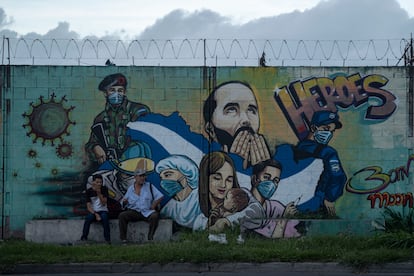

Relief and fear intertwine when Nayib Bukele’s name is mentioned in El Salvador. It invokes the relief that the president’s security model has finally cornered the maras — criminal gangs — and the fear of what his ruthless war will bring to a divided society. The success of this security model rests on sacrificing rights and freedoms. While many justify and applaud it — hence the president’s sky-high popularity — the consequences are democratic backsliding and erosion of the rule of law.
Many Salvadorans, like Don Cabaña, don’t seem to care about the consequences. “Who knows how many families they killed or how many young women they raped. And now that they’re in jail, they have the audacity to cry and ask for forgiveness?” The 60-year-old man’s mood darkens when he remembers how life used to be in his neighborhood of Margaritas, and how happy he feels to be here watching a soccer game. “You couldn’t even leave the house. Right here where we’re chatting, they’d sit here all day long.” Who is he talking about? “The gang with the letters,” he whispers. He’s talking about MS-13 — Mara Salvatrucha 13. In this San Salvador neighborhood, the young ones play soccer late into the afternoon, making the most of the remaining daylight. As darkness sets in, the streetlights flicker on and they hang around the field for a while longer, talking and laughing.
Though he’s lived in this neighborhood for 25 years, Don Cabaña (a pseudonym for safety) has never seen anything like this. He’s wearing a T-shirt with the name of the popular Salvadoran president, Nayib Bukele. “My wife and I had them made,” he says proudly. “The president is doing a great job! This guy’s got the smarts and strength to lead the country,” he said. When night falls, the streets of the neighborhood come alive. If a newcomer was told that there are no gangs in this country, they would likely believe it.
In El Salvador, a country with under 6.5 million residents, the government has arrested 71,000 people accused of criminal activities as members of MS-13 or their rival gang, Barrio 18. Their once-ubiquitous graffiti has been erased from the streets. The military has set up checkpoints with tanks on the roads, while the National Police patrol the streets carrying weapons. It’s common to see people being arrested and families clustered outside detention centers hoping to find their loved ones.
Bukele’s war on gangs has resulted in a visible decline in democratic rights and freedoms, according to the United Nations and international human rights organizations like Human Rights Watch. The international community has expressed alarm and concern about the mass trials, construction of mega-prisons, overcrowded jails, police abuse, and hundreds of prisoners who are paraded in government propaganda videos. But other Latin American countries plagued by violence and crime are starting to apply the same strategy. Honduran President Xiomara Castro launched a similar offensive in June. Ecuador recently declared a state of emergency following the assassination of presidential candidate Fernando Villavicencio during a campaign appearance. And hardliners in Colombia and Chile are also espousing similar approaches.
State of exception
The ongoing state of emergency know as the “state of exception” decreed by Bukele has significantly transformed the cultural landscape of this Central American country over the past 17 months. People here often talk in the past tense. Before, you couldn’t walk around here. Before, you couldn’t be out at this hour. Before, you couldn’t go in that neighborhood across the street... “Now we can finally get some rest, you know, sleep at night,” said Mrs. Tere, who has a clothing store in Cimas de San Bartolo, the former headquarters of “the gang with the number” — the Barrio 18 gang. Merchants here were universally extorted. The only difference was the amount to be paid, which depended on the size and success of the business. The gang seized homes from some residents and put them up for rent, while others were charged fees to own a vehicle. One of the alleys in this neighborhood had a wall painted with a huge sign that read: “Welcome to the heart of Barrio 18.” It has now been painted over with a Christmas message.
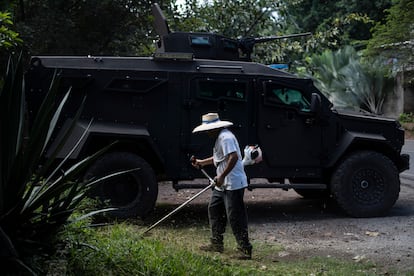
The state of exception was imposed after the secret truce between the Bukele government and the gangs broke down in March 2022. According to government data, the heavy-handed policy has led to a plunge in the homicide rate from 103 to 2 per 100,000 inhabitants. Statistics show that what was once the deadliest country in the Americas is becoming one of the most peaceful, and some politicians in the region have been swayed by the Bukele model. The president actively uses social media to engage in constant campaigning and mock critics. President Bukele clearly wants to be seen as a role model for others in Latin America.
Following Javier Milei’s triumph in Argentina’s primaries, advisers to the Salvadoran president started suggesting that the far-right candidate’s victory was due to “Bukelismo.” In a recent interview with EL PAÍS, Milei confirmed that one of his allies – Nahuel Sotelo – had traveled to San Salvador to examine the approach. “We are studying it because it has been extremely successful,” said Milei.
The 42-year-old Bukele has centered his 2024 re-election bid on security and what political analysts call “punitive populism.” His quest for a second term has been widely criticized as it violates the the country’s constitutional prohibition on consecutive terms in office. However, much of the population firmly believes that only Bukele can guarantee that the gangs will stay in prison, and he enjoys a 90% approval rating according to recent CID Gallup polls. “If he’s not reelected, what will happen to the country? They’ll let all the gangs out of prison and things might get even worse. We definitely don’t want to go back to the old days,” said Guille, a street vendor in downtown San Salvador. About six years ago, she says, her daughter got caught in a crossfire between the police and the gangs, and a bullet went straight through her head and out one eye. “Thank God she lived,” said Guille, who now sells sports jerseys and caps with images of the president and lettering that says, “We’re going for reelection.”
Fear has a new face
The people we interview all want to remain anonymous. The sense of security among Salvadorans is fragile and everyone is wary. People have been arbitrarily accused of gang ties and innocents have been targeted. Over 20 union leaders and five anti-mining activists have been detained during the state of exception. According to Abraham Abrego, a lawyer for Cristosal, “The state of exception regime has become a free pass to violate human rights.”
Salvadorans talk about the “regime” as if it were a living thing with its own set of rules. It determines guilt or innocence, freedom or incarceration. Its voracious appetite always wants more. Cristosal has received a total of 3,500 complaints about arbitrary detentions. Another human rights group called Socorro Jurídico [Legal Aid] has documented 180 deaths of people in the Salvadoran government’s custody. The causes of death are: 50% due to torture or strangulation; 30% due to lack of medical care; and the rest due to unknown causes. Socorro Jurídico Director Ingrid Escobar says their legal analysis indicates that 92% of the victims were innocent. “This arbitrary and irresponsible security policy is not solely focused on criminals,” she said.
Salvadorans have now realized that proving innocence and surviving wrongful imprisonment is an uphill battle in a country where the Attorney General lacks autonomy and judges affiliated with the ruling party control the judiciary system. Relatives are not allowed to communicate with their loved ones in custody, leaving many to wonder if they’re even alive.

Arbitrary arrests have risen due to a legal reform that permits authorities to charge people with “criminal association.” In August 2022, Javier’s wife, a university professor, was arrested by police based on an anonymous tip. When the police broke into her home, they found her breastfeeding their one-year-old son. Have you heard anything or talked to her? “No, nothing,” said Javier. “The police told me that she’d never again see the light of day.”
It’s an all-too-common story. Amanda’s brother was arrested in June 2022 when he was transporting merchandise to his mother’s store. They have not been able to contact him. Rosa’s son was arrested while he was working at a car wash. She says he used to be with MS-13, but served his time in jail, entered rehab, got a job and went back to school. The police put him back in a world he had left behind. Except this time he was put in Bukele’s new maximum security prison — the Terrorism Confinement Center (CECOT). “We still live in fear. Not because of the gangs, but because of the authorities,” said Rosa who has not heard from her imprisoned son. In El Salvador, fear has a new face and now wears a uniform.
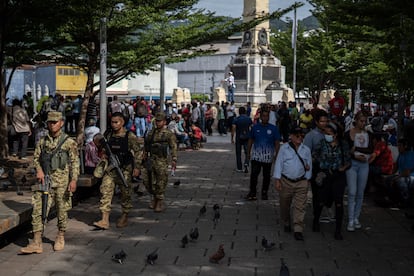
Political opposition
The deprivation of basic rights in El Salvador is the main reason the governments of Colombia and Chile are leery of the Bukele model. Both countries are facing security crises of their own, but leftist presidents Gustavo Petro (Colombia) and Gabriel Boric (Chile) have rejected El Salvador’s approach. Meanwhile, the right-wing opposition say a heavy-handed approach is needed and are using it as a rallying point.
According to political analyst Mauricio Morales from the University of Talca (Chile), every public opinion survey consistently shows that crime is the top concern among the people. “The Bukele phenomenon has had three main impacts,” he said. “First, there is greater demand for law and order. Second, there is a preference for radical right-wing candidates. Third, left-wing governments are criticized for their hesitancy to take strong action against crime.” Viewed through this lens, Morales says, “The El Salvador experience has bolstered authoritarianism over democracy.”
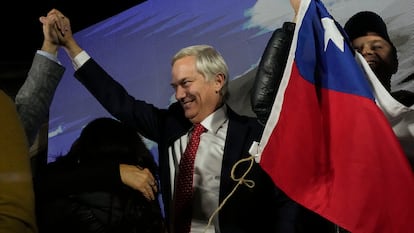
In Chile, after Boric suffered a major defeat to the far-right Republican Party in the recent elections, there is a strong demand for anti-crime measures, according to Axel Callís, an academic at Central University and director of an opinion polling firm. The lack of trust in the justice system amid a crime surge has aggravated the current situation.
In the right time and place, politicians have emerged to defend and promote the Bukele strategy. Under former President Jair Bolsonaro, Brazil seemed to be ripe for an iron-fisted approach to crime, but no local imitators ever surfaced. Even under leftist President Lula da Silva, Brazilian police have killed more people in Rio de Janeiro and Salvador de Bahia than police in the entire United States. Prisons are mostly controlled by two main crime groups: Primer Comando da Capital (PCC) and Comando Vermelho.
Colombia
Colombia stands out as one of the countries where Bukele’s strategy resonates the most. This is not only due to his string of social media spats with President Gustavo Petro, but also because several right-wing politicians have stood behind Bukele’s approach. In a recent radio intwerview, Diego Molano, a candidate for mayor of Bogotá and protégé of former President Álvaro Uribe, said, “We need a prison in Bogotá, a mega-prison to hold at least 3,000 criminals... In El Salvador, criminals are arrested, prosecuted and sent to jail. But in Colombia, criminals and terrorists are actually rewarded and set free. The world has turned upside down!”
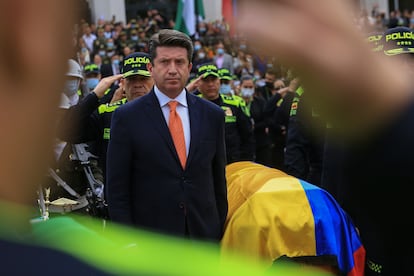
María Fernanda Cabal, one of the most extreme right-wing politicians in Colombia, has also expressed admiration for the Salvadoran president. “He goes too far sometimes, but it’s worthwhile approach. Still, there has to be a balance, otherwise it’s just a hardline dictatorship,” she told EL PAÍS in May. That same month, a Datexco opinion poll asked Colombians if they would prefer a president like Bukele: 55% said yes. In June, an Invamer survey asked Colombians about Bukele: 49% said they had a favorable opinion and only 10% rejected him outright. Earlier in the year, right-wing Semana magazine’s cover proclaimed “The Bukele Miracle.” Meanwhile, Colombian moderates openly fret about sacrificing freedoms and rights for the sake of law and order. The forthcoming electoral cycles in Latin America will certainly bring more intense political battles over the Bukele model.
Sign up for our weekly newsletter to get more English-language news coverage from EL PAÍS USA Edition